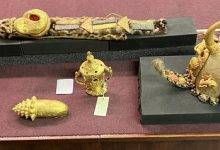
The public has been cautioned to be on the lookout for possible signs of the Marburg Virus Disease (MVD) following the confirmation of three cases in the country.
According to the Ghana Health Service (GHS), a fourth suspected case was currently being investigated, urging citizens to report any sudden illness at the health facilities to contain further spread of the disease.
The Director-General, Dr Patrick Kuma-Aboagye, gave the advice in an interview with the Ghanaian Times last Friday.
He said symptoms included high fever, severe headache and malaise, muscle aches and pains, bloody diarrhoea, bleeding from gums, skin, eyes and bloody urine, usually occurring from two to 21 days.
Dr Kuma-Aboagye said the fatality rate of MVD was high compared to COVID-19 hence the need for the public to stay vigilant and adhere to preventive protocols.
“Do not wait to start bleeding before you report at the health centre and we advise that for all suspicious deaths, call health workers to find out the cause of death before handling the body even if it is an animal,” the DG of GHS said.
The DG said, currently the GHS together with the Wildlife Division and partners was working to establish the source of the outbreak in the country.
“The most important thing we are doing now is working with our partners to identify the source, where did it come from and how did it come about, we need to know that,” Dr Kuma-Aboagye said.
He said all contacts traced to confirmed cases have so far tested negative to the virus adding that “the mother of the second case who is also wife of the first case, is still healthy and showing no sign of illness.”
“She is in isolation and we continue to run tests on her. We are hoping that if the next test turns out negative, we can discharge her,” he stated.
Dr Kuma-Aboagye said the GHS had increased its surveillance systems to early detect and contain spread of the disease while undertaking risk mapping of sub-districts to gauge the level of possible spread.
Marburg is a severe viral haemorrhagic fever often causing fatal illness in humans.
It is transmitted to people from fruit bats and spreads among humans through direct contact with the bodily fluids of infected people, surfaces and materials.
Illness begins abruptly with high fever, severe headache and malaise.
Many patients develop severe haemorrhagic signs within seven days and case fatality rates have varied from 24 per cent to 88 per cent in past outbreaks depending on virus strain and case management.
Although there are no vaccines or antiviral treatments approved to treat the virus, supportive care including rehydration with oral or intravenous fluids and treatment of specific symptoms, improves survival.
A range of potential treatments, including blood products, immune therapies and drug therapies, are being evaluated by the WHO.
To prevent infection, the public is advised to avoid contact with body fluids (such as urine, saliva, sweat, faeces, vomit, breast milk, and semen) of people who show any of the virus.
Hand hygiene practice including frequent hand washing with soap and under running water or use an alcohol-based hand sanitiser, is highly encouraged.
Of the three confirmed cases in the country, all involving one family, father and son have died with mother under treatment for full recovery.
BY ABIGAIL ANNOH
.






